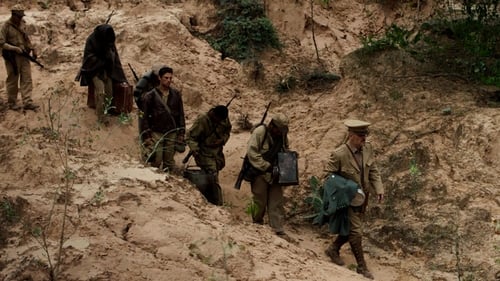
Writer
In 1934, Bolivia is at war with Paraguay. Liborio and Ticona and other Bolivian indigenous soldiers are lost in the hell of the Chaco, under the commandment of German Captain Kundt. They're looking for the Paraguayan enemy that they haven't seen for months, and that they will never find. They leave together in a search that will make them realize, progressively, the destiny they have been pushed into and the inevitable condition of a defeated troop. They're walking like shadows, wandering forever in the middle of dust and silence.

Director
In 1934, Bolivia is at war with Paraguay. Liborio and Ticona and other Bolivian indigenous soldiers are lost in the hell of the Chaco, under the commandment of German Captain Kundt. They're looking for the Paraguayan enemy that they haven't seen for months, and that they will never find. They leave together in a search that will make them realize, progressively, the destiny they have been pushed into and the inevitable condition of a defeated troop. They're walking like shadows, wandering forever in the middle of dust and silence.

Producer
When the colourful ice-cream van rides through the deserted streets of the village, there are no children trailing behind it. In Plazuela, a peaceful hamlet lost in a mountainous region of Ecuador, only a handful of old ladies remain, who are all widows. In the gloom of their houses, photos of those who are gone hang on walls: husbands who have passed away a few years earlier, children gone to work in the big cities or abroad, and grandchildren who have grown up far away from them.

Writer
In the San Pedro male prison of La Paz, Bolivia, 1500 prisoners coexist in a space originally designed for only 300 nuns. Inside, it is like a small city, with businesses and services abound. The prisoners make their living inside the enclosure as they would outside. There is a strong self-organization that plans every-body's lives. As if it weren't enough, there are hundreds of women, wives of the inmates, and almost 300 children, who chose to share their captivity. They are non-convicted beings that accepted living behind bars with the only purpose of preserving a united family. The documentary shows the life of a family inside the jail of La Paz.

Director
In the San Pedro male prison of La Paz, Bolivia, 1500 prisoners coexist in a space originally designed for only 300 nuns. Inside, it is like a small city, with businesses and services abound. The prisoners make their living inside the enclosure as they would outside. There is a strong self-organization that plans every-body's lives. As if it weren't enough, there are hundreds of women, wives of the inmates, and almost 300 children, who chose to share their captivity. They are non-convicted beings that accepted living behind bars with the only purpose of preserving a united family. The documentary shows the life of a family inside the jail of La Paz.

Director
What can represent the confinement for a person. The emotions, changes, uncertainties and traumas that are generated in a space/situation limit. Place from where a particular form is constructed to see the life and the freedom.




